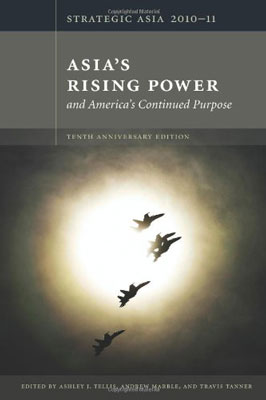Source: The National Bureau of Asian Research
 Co-edited and introduced by Ashley Tellis, with chapters by leading Asia specialists, this book, the tenth volume in NBR’s Strategic Asia series, takes stock of the Strategic Asia region by providing an integrated perspective on the major issues that influence stability in the region. In this volume, leading experts examine Asia’s performance in nine key functional areas to provide a continent-wide net assessment of the core trends and issues affecting the region.
Co-edited and introduced by Ashley Tellis, with chapters by leading Asia specialists, this book, the tenth volume in NBR’s Strategic Asia series, takes stock of the Strategic Asia region by providing an integrated perspective on the major issues that influence stability in the region. In this volume, leading experts examine Asia’s performance in nine key functional areas to provide a continent-wide net assessment of the core trends and issues affecting the region.
Order this book, or read the introduction by Ashley J. Tellis for free.
About the Editors:
Ashley J. Tellis, Senior Associate at the Carnegie Endowment for International Peace and Research Director of the Strategic Asia Program at NBR, served in the U.S. Department of State as senior adviser to the Undersecretary of State of Public Affairs, and previously as senior adviser to the Ambassador at the U.S. Embassy in India. He also served on the National Security Council Staff as special assistant to the President and senior director for Strategic Planning and Southwest Asia. He is the author of India’s Emerging Nuclear Posture (2001) and co-author of Interpreting China’s Grand Strategy: Past, Present, and Future (2000), as well as the co-editor of seven most recent volumes of Strategic Asia, published by NBR.
Andrew Marble is the Editor at the National Bureau of Asian Research.
Travis Tanner is the Senior Project Director and Director of the Pyle Center for Northeast Asian Studies at the National Bureau of Asian Research.





